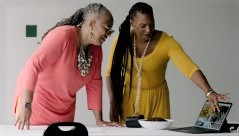AARP Hearing Center
No woman should die giving life. Our specialized, portable Solar Suitcases bring electricity to obstetric facilities in low-income countries that lack nighttime lighting, because we believe every woman has the right to deliver safely in a well-lit health center. In the past 13 years, we’ve deployed 8,400 systems to these health facilities, improving obstetric care for millions and saving lives.
The problem I’m trying to solve
Medical facilities in sub-Saharan Africa not only lack advanced equipment — half of them don’t have reliable electricity. This energy poverty means there may be no lights to perform nighttime obstetric care like emergency cesarean sections, no refrigeration to store blood for transfusions, and no power for electronic medical devices. Complications from pregnancy and childbirth kill 300,000 women across the world each year. In sub-Saharan Africa, there are 390 maternal deaths for every 100,000 live births, compared to 33 in the U.S. Lack of electricity is one factor behind these dismal statistics. Some facilities resort to candlelight or kerosene lanterns, which throw so little light it’s hard to even insert an IV. Others own generators but lack the fuel that powers them. Many resort to turning away pregnant women who arrive after dark.
The moment that sparked my passion
I was an OB/GYN with a thriving practice in Berkeley, California. But back pain from several severely degenerated discs sent my career to a crashing halt. After a year of rehabilitation, I began a graduate program in public health at the University of California, Berkeley. During my studies, I had the opportunity to observe obstetric care in a Nigerian state hospital. I was stunned to learn that women in northern Nigeria face a 1 in 13 lifetime risk of dying during their reproductive years from complications of pregnancy and childbirth. The hospital had sporadic power, so I watched helplessly as women and newborns failed to get lifesaving care during power outages.
I shared my experiences with my husband, Hal Aronson, an expert in renewable energy. Hal designed a solar electric system for the hospital. He also prepared a portable unit intended for demonstration, but when the healthcare workers at the hospital saw his suitcase-sized invention, they were overjoyed. They showed me the utility that a compact unit could have in medical settings. They quickly directed me to other local birthing facilities that would also benefit from this portable device. This was the inspiration for the Solar Suitcase that has now reached millions.






























































More About AARP's Purpose Prize
Learn about previous winners and fellows
AARP's Purpose Prize FAQ
Read the official rules, eligibility, odds and prize disclosures